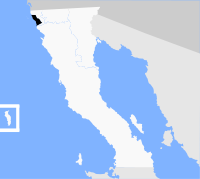Playas de Rosarito, Baja California
| Rosarito Beach | ||
|---|---|---|
| City | ||
|
Ciudad de Playas de Rosarito City of Rosarito Beach |
||

Rosarito
|
||
|
||
| Motto: A Horizon of Possibilities | ||
 Location of Rosarito in Mexico |
||
| Location of Rosarito in Mexico | ||
| Coordinates: 32°20′32″N 117°3′22″W / 32.34222°N 117.05611°WCoordinates: 32°20′32″N 117°3′22″W / 32.34222°N 117.05611°W | ||
| Country |
|
|
| State |
|
|
| Municipality | Rosarito Beach | |
| Municipality established | June 29, 1995 | |
| Government | ||
| Elevation | 14 m (46 ft) | |
| Population (2010) | ||
| • Total | 65,278 | |
| Time zone | PST (UTC−8) | |
| • Summer (DST) | PDT (UTC−7) | |
| Area code(s) | 661 | |
| Website | http://www.rosarito.gob.mx | |
| Sources: (in Spanish) INEGI, Enciclopedia de los Municipios de México | ||
Rosarito is a coastal resort city in the Mexican state of Baja California located approximately 10 miles south of the U.S. border in Rosarito Beach Municipality. Often mistakenly called "Rosarito Beach" because of the well-known Rosarito Beach Hotel, the town of Rosarito is one part of the municipality named Playas de Rosarito ("Beaches of Rosarito").
Its beaches and dance clubs are a popular destination for young people from the United States during the Memorial Day and Labor Day weekends. Rosarito Beach is the seat of the municipality of Rosarito Beach. The city is the second largest in the Tijuana metropolitan area and southern beach city of the San Diego–Tijuana international metropolitan region.
Additionally, it is the westernmost municipal seat in Mexico, slightly farther west than neighboring Tijuana, which lies inland to its north-northeast. As of 2010, the city had a population of 65,278.
Evidence of the presence of Paleo-Indians in the region has been dated as early as 2,000 BCE By 1,000 BCE, a group emerged that is recognizable as the Yuman ancestors of the Kumeyaay, who continued to inhabit the northern portion of the Baja California Peninsula at the time of European contact. The Kumeyaay referred to the area now known as Rosarito Beach as Wa-cuatay, which translates to "big houses" in the Kumeyaay language.
After conquering the Aztec Empire, Hernán Cortés sent expeditions to explore what he believed to be the Island of California. In 1533, mutineer Fortún Ximénez was the first European to land in Baja California, at La Paz, Baja California Sur. In September 1542, Juan Rodríguez Cabrillo passed through the Rosarito Beach area on his way from Ensenada to San Diego Bay. 1697 saw the establishment of the first permanent European settlement in Baja California in a Jesuit mission at Loreto. Rosarito would soon be caught in a power struggle between Jesuits, Dominicans, and Franciscan monks for decades.
...
Wikipedia


